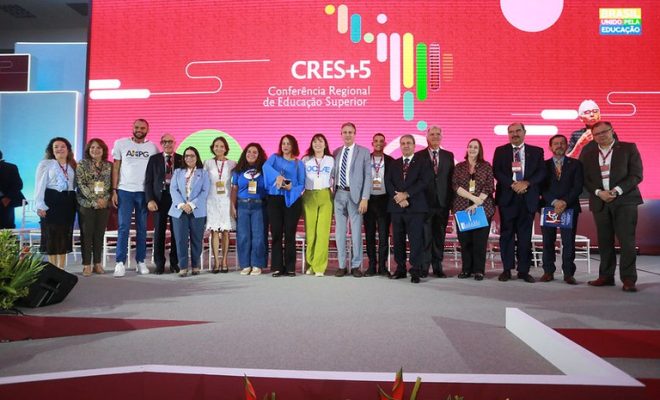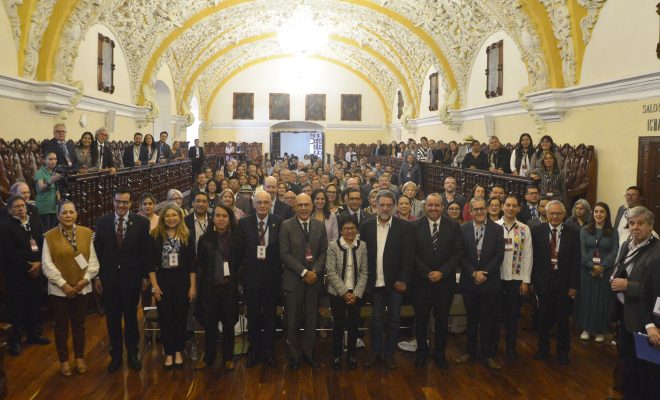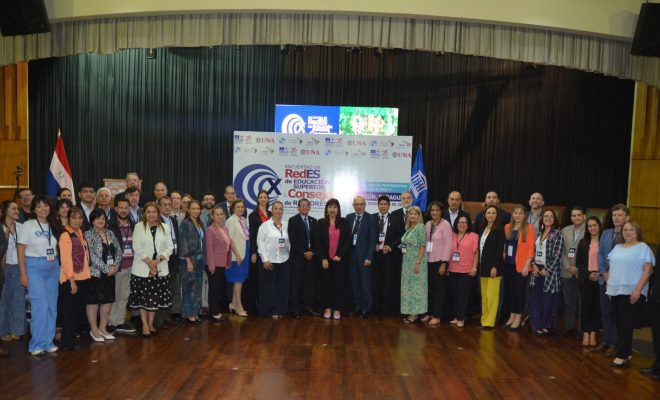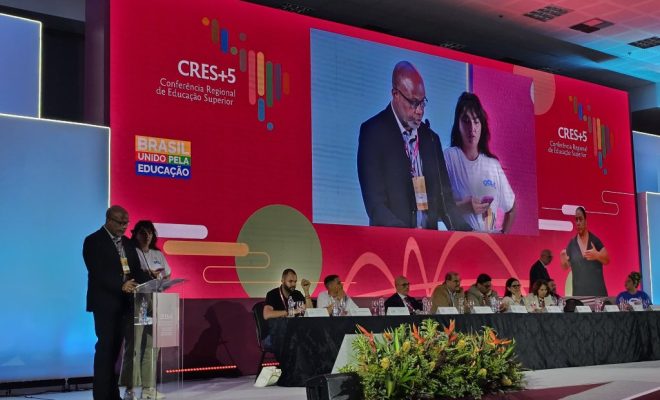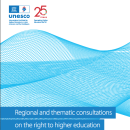Broad consensus on the progress of the 12 thematic axes of the next CRES+5
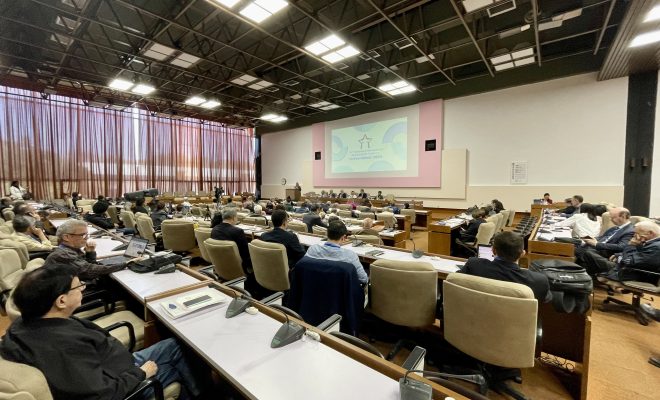
On February 7th and 8th, in the framework of the University Congress 2024, the fourth and last meeting before the follow-up meeting of the Regional Conference on Higher Education (CRES+5) was held in Havana (Cuba), where details were finalised, consensus was reached and content was refined around the 12 established lines of work to enable a final declaration at CRES+5, which will be held in Brasilia, between 13 and 15 March 2024.
The Havana meeting served to deepen the findings of the different work teams, which previously carried out an exhaustive bibliographic review, collected and analysed data and conducted online public consultations, all to ensure the diversity and representativeness of the voices involved in the collective definition of higher education in Latin America and the Caribbean.
With these inputs, twelve basic texts were elaborated, which were widely discussed in participatory sessions in Havana, thus paving the way for establishing a broad consensus that will result in inclusive quality higher education for all throughout life.
It was also agreed to create a drafting committee for the CRES+5 Declaration, which will work from the base documents and with the contributions received from the open consultation.
The event had closing remarks from the Cuban Minister of Higher Education, Walter Baluja García, who expressed his gratitude for the holding of this session within the framework of Universidad 2024 and for the opportunity to share different perspectives and visions regarding the achievement of higher education with greater relevance, with greater social commitment and able to transform the realities of the peoples of the region, with a view to a better future based on talent, science and innovation.
Findings, progresses, and challenges ahead
Reunited in Havana, representatives of the working groups delivered the highlights of each theme to summarize the most relevant and main findings that have come to light during the months of work and exchange with the people involved in the consultation processes.
Axis 1 – Higher education as part of the education system in Latin America and the Caribbean
Higher education systems and the education system as a whole face the challenge of advancing in the articulation between all levels of education, thus strengthening people’s training-labour trajectories and reducing the stagnant pathways in national education systems. The political, social, economic, ecological and educational transformations facing the planet require coordinated action by the different higher education institutions and the promotion of lifelong learning as a right for all. This is the invitation and debate of this Conference.
Axis 2 – Higher education, cultural diversity and interculturality in Latin America and the Caribbean
The panorama of progress in the area of cultural diversity and interculturality with respect to the CRES 2018 Declaration is heterogeneous. In some countries, significant progress has been made in terms of both public policies and initiatives from higher education institutions (HEIs). However, in most countries, there are valuable initiatives promoted by numerous HEIs and organisations of indigenous and Afro-descendant peoples that cannot grow due to a lack of appropriate public policies and budgets.
Axis 3 – Higher education, internationalization and integration in Latin America and the Caribbean
In order to face the challenge of regional integration, there is a call for a real articulation between state policies and the academic strategies of higher education institutions, in order to strengthen, expand and perpetuate the regional cooperation initiatives that HEIs are promoting. It is necessary to review the objectives for the next five years, in order to propose the creation of a regional knowledge agency, with a public budget allocation that can design and promote collaborative research, innovation and extension programmes on scientific, economic, social and environmental problems of common relevance, and a broad programme of mobility, training and academic exchange. Similarly, there is a call for progress in the recognition of degrees and diplomas, through the new regional convention, but also for greater integration between the governmental level and educational institutions, which can and should achieve recognition through their regimental practices.”
Axis 4 – The role of higher education in the face of social challenges in Latin America and the Caribbean
Higher education has a fundamental social and political role in strengthening Latin American and Caribbean democracies in the face of the violation of public freedoms and human rights, different forms of authoritarianism and social violence in the region. We understand higher education as an inalienable human right and a duty of the State to ensure access, permanence and graduation, considering historically excluded or underrepresented groups, and to encourage the link between higher education and society through actions that promote social change and contribute to the rebuilding of fairer, more equitable and inclusive societies.
Axis 5 – Scientific and technological research and innovation as engines of human, social, and economic development for Latin America and the Caribbean
It can be synthesised in the analysis carried out in Axis 5 that the greatest threat to science and technological development in the last five years in the region is the siege to democracy as a consequence of neoliberal authoritarian governments; therefore, to defend science and technology it is necessary to defend democracy; however, it can also be pointed out that to defend democracy, it is necessary to defend a democratic, humanistic science that recovers the critical sensitivity of the arts, and to reaffirm the public sense proposed in the CRES 2018.
Axis – 6 Strategic role of higher education in the sustainable development of Latin America and the Caribbean
HEIs in Latin America and the Caribbean are called to exercise associative and innovative leadership at regional and global level in the construction of sustainable citizenship, setting ambitious goals, closely monitoring progress towards them, together with governments, private sector and civil society, safeguarding identities and enhancing development strategies of our societies, defending the values of the 2030 Agenda and beyond, and empowering youth in the care of our common future.
Axis 7 – Decent work and living conditions for higher education stakeholders
As a working group of axis 7, the main idea is to create an international observatory to guarantee decent work in HEIs, to generate public policies that have a positive impact on the labour rights of HEI workers, which will have an impact on educational and institutional quality.
Thematic Axis 8 – The impact of COVID in higher education
The primary finding of the working group for thematic axis 8 is the identification of the redefinition of post-pandemic vocational education as an urgent need. This responds to the strategic role of higher education in sustainable development, marked by the integration of e-learning strategies and the upgrading of teaching competencies. The pandemic accelerated the transition towards multimodality, underlining the importance of adapting education to new labour market realities and social demands.
Axis 9 – Inclusion, diversity, and the role of women in higher education
The key aspect of the work on Axis 9 is that diverse, inclusive and gender-equitable academic spaces and equal opportunities for all can only be reached by considering the intersectional dimension of discrimination. This should be done by systematically identifying the specificities of diverse characteristics (e.g., gender, race, ethnicity, sexual orientation, religion, health, geocultural origin, social class, socioeconomic status, and disability) and by removing all barriers obstructing equal access, permanence and progression in Higher Education.
Axis 10 – Financing and governance in higher education
Since CRES 2018, Latin America and the Caribbean has not been able to match the growth of enrolment in higher education and the requirements of science and technology systems with the resources invested for their functioning. States must ensure long-term, predictable and sustainable funding schemes to allow for strategic planning that enhances the contributions of higher education to collective well-being and equity. To avoid stratification of systems, public policies should also address inequality in the allocation of resources between institutions and avoid public funding of private for-profit institutions. In terms of governance, the promotion of democratic functioning of higher education institutions should be articulated on the basis of transparency, social accountability and autonomy connected to society and the functioning of national education systems.
Axis 11 – Autonomy of higher education institutions
The importance of defining percentages in national budgets for higher education institutions, as well as clear accountability mechanisms for results that translate the social value of their contributions. Autonomy must be seen as implying a profound awareness of their social responsibility, which encompasses a commitment to substantive equality, accountability and recognition of interculturality in order to work with an unwavering willingness to serve as solutions to society’s demands. Likewise, recognising that this responsibility must be exercised with a questioning and proactive approach to the reality of each context.
Axis 12 – The futures of higher education in Latin America and the Caribbean
Imagining the future of higher education in Latin America and the Caribbean presents us with the challenge of thinking together with our peoples about new models of sustainable development, capable of profoundly transforming our present in so as to guarantee a future of peace, integration and dignity for future generations, while at the same time offering the whole world new ways of living well.
Axis 12.2 – The futures of higher education in the Caribbean
The future of higher education in the Caribbean must be aimed at developing substantive processes that generate sustainable contextual responses and increase the communication and support infrastructure that unites us with Latin America. Principles such as decolonization, inclusion, equity, quality, efficiency, autonomy, participation and accountability must guide these processes in which financing and technology are essential.
RELATED ITEMS
